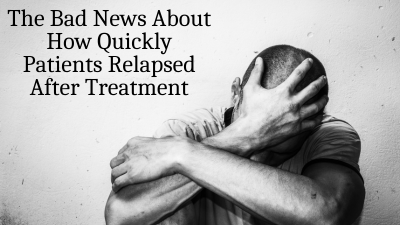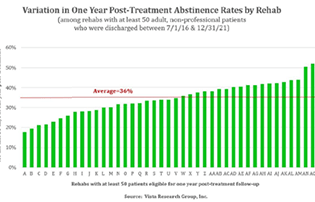
Addiction is a devastating disease. A patient can leave treatment completely confident in their ability to remain abstinent and find themselves so overwhelmed by the intensity of their cravings that they start using again the very same day.
This heartbreaking scenario happens far too often. In Vista’s research, among 5,916 patients who admitted using alcohol or nonprescribed drugs at some point during their first post-treatment year, 8% reported using in the first hours after leaving treatment and 20% within the first few days. Altogether, 55% of those who relapsed during the first year did so during the first month after discharge:

Not surprisingly, about half of those who used within the first few hours either walked out of treatment against medical advice or were asked to leave due to substance use or behavioral issues.
Unfortunately, the graph for patients who successfully completed all recommended treatment doesn’t look terribly different. Twenty-two percent (22%) of treatment graduates who relapse sometime in their first year will do so in their very first week out of treatment. Almost half (48%) will do so within one month of discharge.

Distressingly, 150 patients who successfully completed all recommended treatment at a treatment center in the Vista Research Network lost the battle against their nemesis within the first few hours and 800 within the first week!
Factors Affecting Speed of Relapse
There are numerous factors that affect how quickly someone is to likely to relapse after treatment:
Patients who spend less than 20 days in treatment are far more likely to relapse quickly than those who remain in treatment for at least 21 days. Interestingly, the percentage of relapsers who relapsed within the first week did not continue to decrease with higher lengths of stay:

- Patients who commited at the start of treatment to doing whatever it takes to remain drug- and alcohol-free were less likely to relapse quickly:

- Patients in treatment for alcohol addiction were also less likely to relapse quickly after treatment compared to those whose primary drug of choice was a drug:

Maturity & Stability Have the Biggest Impact
While a lot of different factors impact how likely someone is to relapse quickly, it appears that a patient's maturity and the stability they have in their lives are the most important factors. Relapsers under the age of 30 are far more likely to relapse in the first week than those who are 30 or older. Interestingly, gender doesn’t seem to impact the speed at which someone relapses:

Relapsers who are married or widowed and/or who have a stable place to live are also less likely to relapse quickly:

Finally, relapsers who have a full-time job to return to are also less likely to relapse right after leaving treatment:

While there's nothing we can do to change a patient's age or marital status, the more we can do to connect patients with stable housing and a job before they leave treatment, the better. For patients without these resources, it's even more imperative that we provide them with a warm handoff to a sober group home, a recovery support community and/or additional treatment simultaneously with their discharge.
P.S. I recently spoke at TEDxRockville about how to increase the likelihood that a loved one’s treatment leads to recovery. Please share my TEDx talk “How to Get Your Child Back: A Parent’s Guide to Recovering from Addiction” with any families you think might benefit. Thank you very much!




